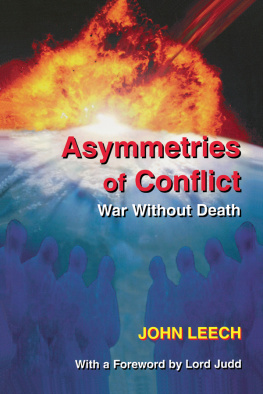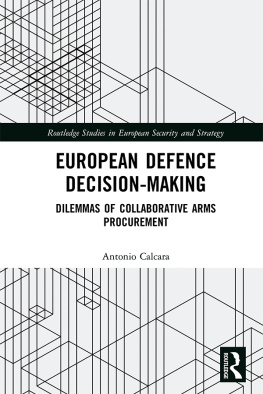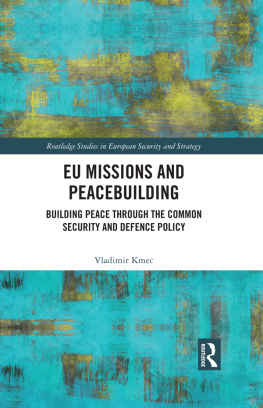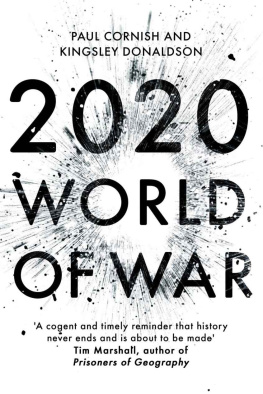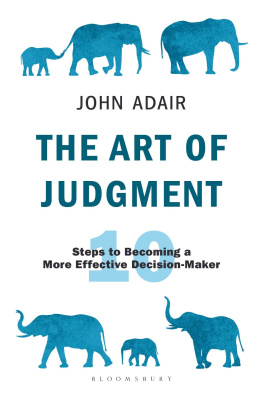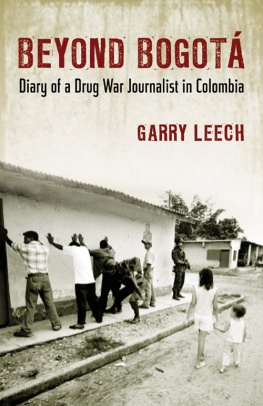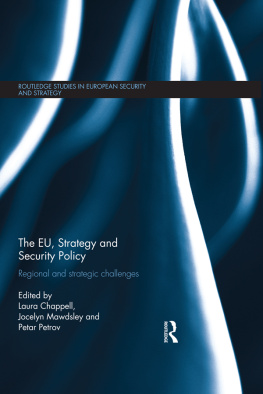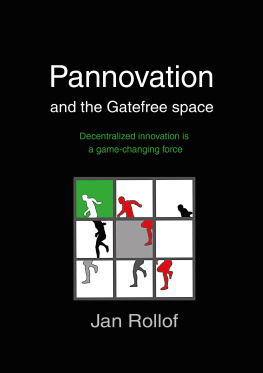First published in 2002 by Frank Cass Publishers
Published 2014 by Routledge
2 Park Square, Milton Park, Abingdon, Oxon OX14 4RN
711 Third Avenue, New York, NY 10017 USA
Routledge is an imprint of the Taylor & Francis Group, an informabusiness
Copyright 2002 J. Leech
British Library Cataloguing in Publication Data
Leech, John, 1925
Asymmetries of conflict: war without death
1. Terrorism-Prevention-International cooperation
2. International relations
I. Title.
327.117
ISBN 978-0-714-65298-6 (cloth)
ISBN 978-0-714-68260-0 (paper)
Library of Congress Cataloging-in-Publication Data
Leech, John, 1925
Asymmetries of conflict: war without death/John Leech,
p. cm.
Includes bibliographical references and index.
ISBN 0-7146-5298-9 (cloth) ISBN 0-7146-8260-8 (pbk.)
1. North Atlantic Treaty Organization Military policy.
2. Europe Military policy. 3. United States Military policy.
4. World politics21st century
I. Title.
UA646.3.L34497 2002
355.031091821dc21
All rights reserved. No part of this publication may be reproduced, stored in or introduced into a retrieval system or transmitted in any form or by any means, electronic, mechanical, photocopying, recording or otherwise, without the prior written permission of the publisher of this book.
Typeset in 11/13pt Century Schoolbook by Cambridge Photosetting Services
ISBN 978-1-315-04017-2 (eISBN)
In homage to our American friends, known and unknown, who continue to search for a just and effective response to the ravages visited on them.
It has been too often said that 11 September changed the world and that nothing will ever be the same again. I wonder. What certainly should have changed on that terrible and cruel day was that nobody not least the US administration could any longer play down or ignore the basic realities of global politics.
The world is totally interdependent. Society is increasingly vulnerable and advanced technology accentuates that vulnerability. Grotesque disparities of wealth, together with the concentration of power, provoke an almost classic pre-revolutionary situation. The millions of destitute, dispossessed and dis-empowered are ripe for manipulation by highly intelligent if disturbed and sometimes psychopathic often well-educated and articulate extremists. These extremists may be resentfully frustrated by their personal exclusion from the power systems, or may reject what they regard as the crude materialism of ideological market economics, or both. Many people with literally nothing to lose, whose lives are one endless struggle to survive, will inevitably sometimes ask whether extremism is not in fact on their side. Most would probably themselves never participate in an act of terrorism, and would be deeply shocked if they witnessed one at close quarters; nevertheless, to exorcise the terrorists is not top of their daily list of priorities. Terrorism thrives in a constituency of ambivalence.
Indeed, how far is fundamentalism in whatever form not frequently a vehicle, rather than the real purpose or cause? The fight to contain terrorism will eventually be won by a relentless, transparent and, above all, effective commitment to social and economic justice, coupled with at least an equal commitment to the meaningful redistribution of power in the world. It will inescapably be a matter of hearts and minds.
The calculating extremist wants to demonstrate that, when under pressure, all our brave words about human rights are not worth the paper on which they are recorded. That cynical victory has to be denied. It is precisely when we are under pressure that our commitment to such principles becomes more important than ever. In the way we respond to provocation, not least when military or police action is necessary, our unyielding commitment to the values we espouse must be there for all to see. It is not a matter of whether the physical specifications of US military prison cages in Cuba technically meet the requirements of the Geneva Conventions; it is, rather, a matter of what pictures of perceived humiliation beamed around the world do to swell the ranks of the extremists.
John Leech has produced a timely commentary. His fascinating combination of learning and experience in NATO and transatlantic affairs, development assistance, civil engineering and the arts enable him to bring a challenging perspective to his analysis of global security issues. What, indeed, is security? He is right to pose the question and I, for one, completely endorse his conclusion that it will be found not only in conflict resolution, peacekeeping and pre-emptive diplomacy, but also in economic and social imperatives and good governance.
His attractively logical, at times even passionate, approach stimulates the question that if we are preoccupied with the threats of global terrorism, how is it that we continue with a culture in which it is acceptable or even laudable to export arms unless there is an exceptional reason, sufficiently well argued where it matters, that in some specific instance it would be unwise to do so? Surely, the culture should be that arms are potentially so dangerous to stability and security that they should never be exported unless there is an over-riding and convincing case to do so for security reasons? In the meantime, where exactly do the arms we export end up? On occasions, alas, confronting us!
But the writer takes us much further than this. Is war as we have understood it any longer relevant or likely? If not, what are the scenarios that already confront us and where will they lead us in the future? Are we muscle-bound into our existing military technology? If international peacekeeping and anti-terrorism are to be the real demands, what changes of mindset will be necessary? What of psywar and psyops, and what of the ethical concerns they rightly generate?
If we are defending a decent society based on integrity, responsibility and similar values, there is a danger that playing fast and loose with the truth cannot be limited to the tactics of conflict situations. It could too easily infect our social mores as a whole, thereby becoming self-defeating. Means not infrequently erode the ends. This book does not resolve the dilemma, but it does us a service by encouraging debate and setting out the criteria.
And then we come to non-lethal weapons. Here, perhaps I can be forgiven for saying, the text becomes agonisingly controversial. Initially, many readers will be filled with misgivings. Frankly, I am myself. But if we are moving into an age of international policing, these questions do have to be asked. Is it a matter of traditional military mobilisation or nothing, when smart sanctions and the rest are inappropriate or have failed? What clearly needs very careful consideration is how far, freed from the inhibiting restraints of well-tried military techniques, the adherents of might is right, in a disturbingly simplistic upsurge of were good and theyre evil politics, might be enabled to extend their omnipotence unchallenged across the globe. In the end, do we see human destiny fulfilled or not by unipolarism; and what are the implications of psywar, psyops and non-lethal weapons in this consideration?
Whether or not we opt if opting is any longer a practical possibility for a multipolar world, brings us to John Leechs thoughts on Europe and the transatlantic equation. He nails his colours to the mast as a European with a profound transatlantic loyalty. As with so much of the rest of what he writes he honestly, if not always with the outcome he would himself favour, provokes thought. But is he altogether too sanguine, given the new realities of the US leadership and, for that matter, of the Israeli and what they represent? While, tellingly, his plea is to be ahead of the game, in these respects the game may have got ahead even of him.

